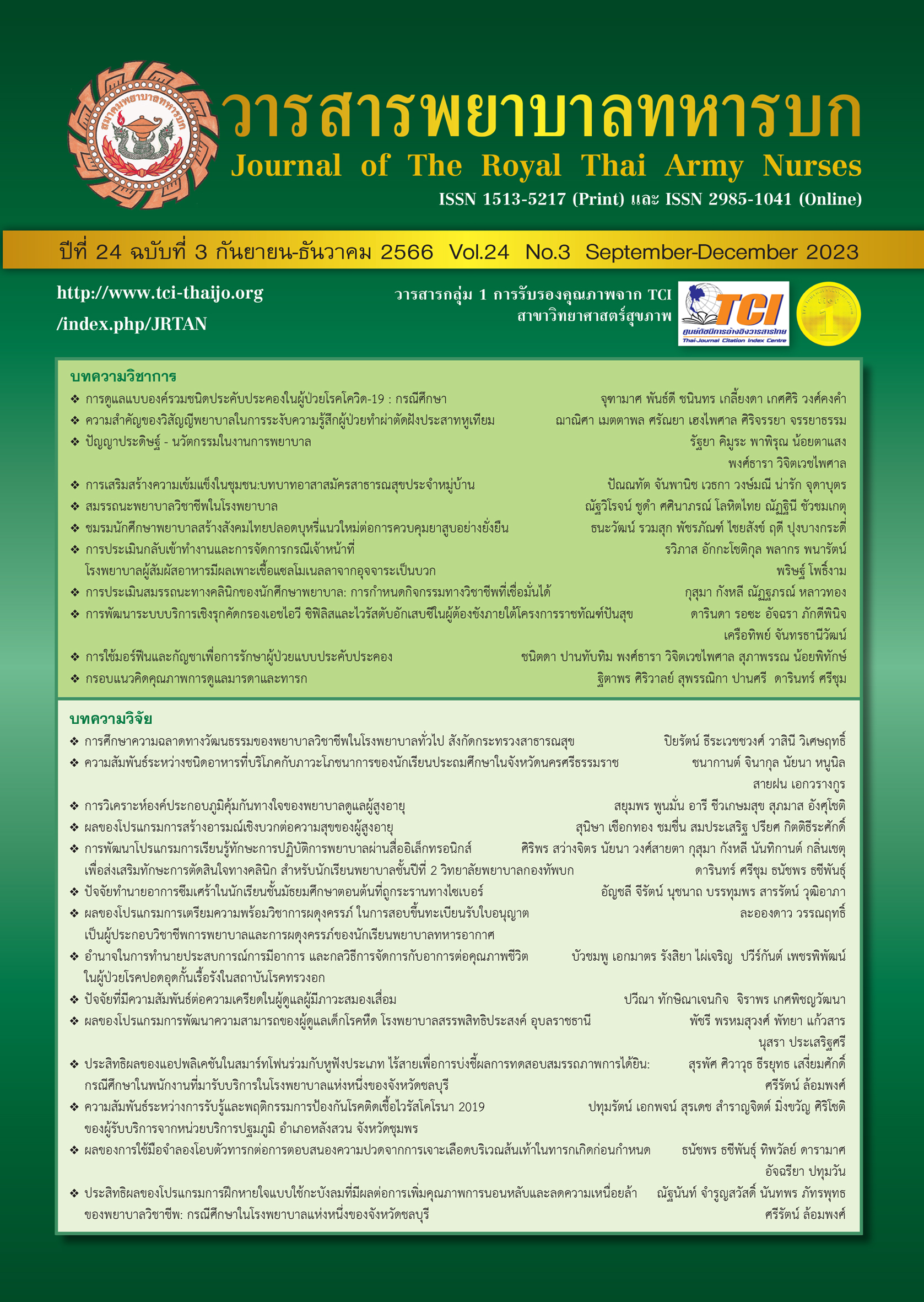Bedridden Patients Care through Family Caregiving and Community-Based Model in New Normal
Keywords:
Bedridden patients, Caregivers, Bedridden patient care through family caregiving and community-based modelAbstract
This qualitative research aimed to explain the experiences and present the bedridden patient care through family caregiving and a community-based model in the new normal. The hermeneutic phenomenology of Martin Heidegger was employed. The research tool was an in-depth interview form used with 56 key informants: 20 bedridden patients, 20 caregivers and 16 community members. The research was conducted in Nakhon Phanom Province from October 2021 to February 2023. Data were analyzed according to the van Manen’s approach.
The results revealed that the experiences in caring for bedridden patients of families and communities in the new normal can be classified based on the following 4 lifeworld existentials. 1) Corporeality consisted of fatigue, struggling life and roles that cannot be escaped. 2) Temporality comprised the golden opportunity of paying gratitude, paying off their past deeds, and living with hope and waiting for a miracle. 3) Spatiality included the world of modern society and being lonely in the wide world. 4) Relationality consisted of family not leaving any family members behind, true friends in difficult times, and public mind. The bedridden patient care through family caregiving and community-based model consisted of 3 main components: Acceptance, Adaptation, and Development, called “AAD Model”.
In conclusion, the bedridden patient care through family caregiving and community-based model should be used with the community model and its efficacy and effectiveness should be evaluated.
Downloads
References
Kasemkitwattana S, Prison P. Chronic Patients Family Caregivers: A Risk Group That Must Not Be Overlooked. Thai Journal of Nursing Council. 2014; 29(4): 22-31. (in Thai)
Social Development and Human Security, Nakhon Phanom Province. social situation report Nakhon Phanom Province for the year, 2021; 2021. (in Thai)
Thurapang P, Mahasena P, Panuwet R, et al. The development of the homebound patient and bedbound patient care system in Tambon Nong Bou Amphoe Moung Nong Bua Lamphu Province. Journal of Health Science and Community Public Health. 2018; 1(2): 15-29. (in Thai)
Utaisang A, Pearkao C, Junsevg K, et al. Experiences of family members in caring of stroke patients: A case study in the border provinces of the Upper Northeast of Thailand. Open Access Macedonian Journal of Medical Sciences. 2021;9(G):172-9.
Office of the National Economic and Social Development Council. National Economic and Social Development Plan No. 12. 2016; 2016. (in Thai)
Fisher D, & Heymann D. Q & A: The novel coronavirus outbreak causing COVID-19. BioMed Central academic journals. 2020; 18(57):1-3.
Orem D.E. Nursing: Concepts and Practice (6thed.). St. Louis, MO: Mosby; 2001.
Roy SC, Andrews HA. The Roy Adaptation Model. 2nd ed. Connecticut: Appleton and Lange; 1999.
Heidegger M. In: MacQuaeeie J, Robinson E, editors. Being and Time. New York: Harper and Row; 1962.
Lincoln YS, Guba EG. Paradigmatic controversies, contradictions, and emerging confluences. In: Denzin NK, Lincoln YS, editors. The Sage Handbook of Qualitative Research. 3rd ed. Thousand Oaks: SAGE; 2005.
Chantawanich S. Qualitative research methods. This time 25 Bangkok: Chulalongkorn University 2011. (in Thai)
Van Manen M. Researching Lived Experience: Human Science for an Action Sensitive Pedagogy. New York: SUNY Press; 1990.
Sareeso P, Praison P, Thohinung U, Umsrewaing W, Fongrat N. The situation, health problems and care needs of older persons with chronic illness: Chiangrai municipality. Journal of Nursing Science & Health. 2017; 40(2): 85-95. (in Thai)
Jooprempree k, Tabootwong W. Experiences of Primary Caregivers in Caregiving for Older Family Members With Bedridden at Home. Boromarajonani College of Nursing, Uttaradit Journal. 2022; 14(1): 191-205.
Maneelert C. Development of Application for Bed-Bound Older Adults Care Promotion via Augmented Reality Technology. Journal of Applied Information Technology. 2021; 7(2): 83-94. (in Thai)
Srisuk A, Kespichayawattana J. Lived experiences of sons being caregiver for dependent elderly parents. Journal of Nursing Science Chulalongkorn University. 2019; 31(2) : 72-84. (in Thai)
Fongkerd S, Sinsuesatkul S, Tantalanukul T. Community Nurse Practitioner’ Role in Caring Family Caregivers of Bedridden Patients. 2020; 21(1): 46-55. (in Thai)
Sathira–Angkura T, Haruthai C, Leelawong S, Kladjompong P, Janta-Um-Mou U, Suwonkesawong S, et al. Nursing Curriculum Development to Promote Healthcare Self-management in Patients and Caregivers. Journal of The Royal Thai Army Nurses. 2019; 20(3): 104-13. (in Thai)
Downloads
Published
How to Cite
Issue
Section
License
Copyright (c) 2023 Journal of The Royal Thai Army Nurses

This work is licensed under a Creative Commons Attribution-NonCommercial-NoDerivatives 4.0 International License.
บทความหรือข้อคิดเห็นใดใดที่ปรากฏในวารสารพยาบาลทหารบกเป็นวรรณกรรมของผู้เขียน ซึ่งบรรณาธิการหรือสมาคมพยาบาลทหารบก ไม่จำเป็นต้องเห็นด้วย
บทความที่ได้รับการตีพิมพ์เป็นลิขสิทธิ์ของวารสารพยาบาลทหารบก
The ideas and opinions expressed in the Journal of The Royal Thai Army Nurses are those of the authors and not necessarily those
of the editor or Royal Thai Army Nurses Association.






